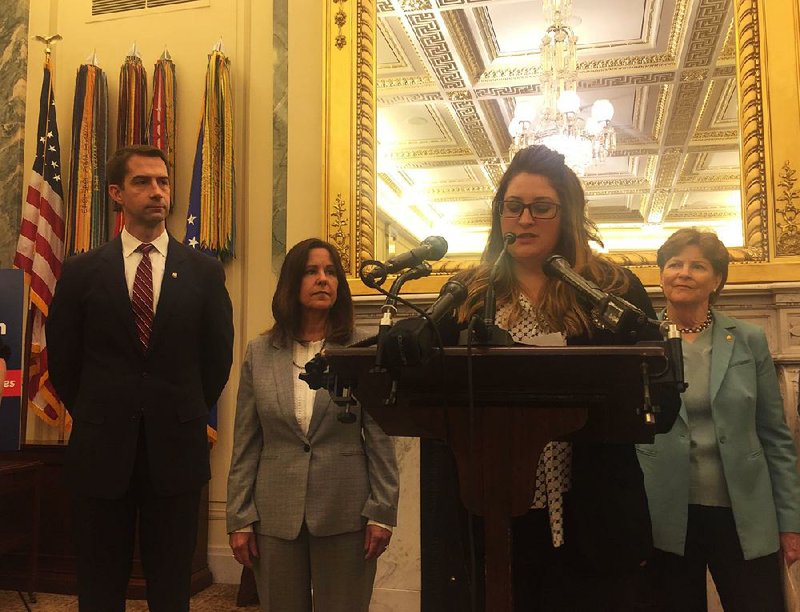WASHINGTON -- When a military family is transferred across state lines, the service member's spouse often encounters a number of bureaucratic obstacles in getting a job.
As a result, many such spouses are unemployed or underemployed, according to the Department of Defense.
Legislation by a bipartisan group of lawmakers Thursday seeks to cut much of the red tape, making it easier for these highly mobile families to make a living.
The Arkansas General Assembly has already passed legislation aimed at removing these types of obstacles in the state.
The federal bill, if approved, would also enable military spouses to maintain residency in a state even if they're transferred to another part of the country.
At a Capitol Hill news conference, Vice President Mike Pence's wife, Karen Pence, stressed the importance of fixing the system. She was joined by military spouses, including Brittany Boccher of Austin, who detailed some of the challenges spouses encounter due to existing laws.
Although the national unemployment rate is 3.6 percent, unemployment among military spouses is 24 percent, Karen Pence said.
Roughly a third of military spouses are in careers that require state licenses. Often, they are required to get new occupational certifications when their spouses are transferred.
Military spouses who are entrepreneurs are typically required to re-register their businesses when they move to a new state.
"Military spouse employment is a very important aspect of strong and resilient military families. We know that if spouses aren't happy, then service members are going to get out of the military sooner and we don't want that to happen," said Karen Pence, the mother of a U.S. service member.
The Portable Certification of Spouses Act seeks to make the transfers -- known as Permanent Change of Station moves -- less complicated.
Introduced by U.S. Sens. Tom Cotton, R-Ark.; Jeanne Shaheen, D-N.H.; and Martha McSally, R-Ariz., the measure would allow the secretary of defense to work with a nonprofit, nonpartisan group -- the Council of State Governments -- to fund the development of "interstate compacts on licensed occupations."
Total costs, over a 5-year period, would be about $10 million, supporters said.
The legislation also would allow military spouses to maintain their states of residency despite being transferred elsewhere.
Service members already are entitled to do so. Spouses typically aren't. The move would enable spouses to vote, obtain driver's licenses and pay income taxes in a state despite no longer being physically there.
In 2017, Arkansas passed a law requiring occupational licensing agencies to expedite the licensing process for military families.
Earlier this year, a law was passed requiring agencies to give "automatic licensure" to active-duty service members who hold "substantially equivalent" licenses in other states. The measure, which also covers "returning military veterans, and their spouses" was signed into law last month by Gov. Asa Hutchinson.
Speaking to reporters, Cotton said the proposed Portable Certification of Spouses Act is "a common-sense bill that will reduce the burden on military families who already shoulder a heavy load for our nation."
Reporters also heard from Boccher, whose husband, Adam, serves at Little Rock Air Force Base in Jacksonville.
Frequent moves, combined with a patchwork of licensing requirements, have complicated things, she said.
"I have grown up with a passion to educate and serve my community. I honed my talents, worked hard throughout my education, [and] paid tuition I couldn't afford, to be a professional educator. I started my career and felt the fulfillment of living my passion and my purpose. But as a military spouse, I know the mission comes first," she said. "I followed my husband and that means sacrificing what I worked hard to achieve."
The legislation, if approved, will ease the burden on those who serve their country, she said.
"You are changing the country with this bill. You are changing the lives of our military families," she added.
Metro on 05/10/2019

